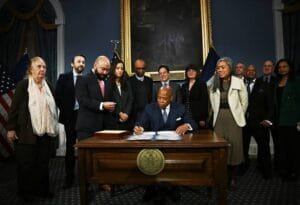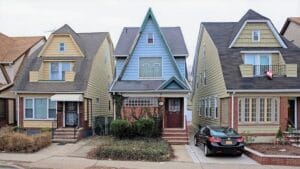NYS DEC partners DOH, advises people with respiratory diseases to limit strenuous outdoor activities

The New York State Department of Environmental Conservation and the State Department of Health have advised people with respiratory diseases to consider limiting strenuous outdoor physical activity when Ozone levels are high.
In a statement by both DEC and DOH commissioners, Basil Seggos and Howard Zucker, said when outdoor levels of ozone are elevated, going indoors usually reduces exposure.
“People, especially young children, those who exercise outdoors, those involved in vigorous outdoor work and those who have respiratory disease (such as asthma) should consider limiting strenuous outdoor physical activity when ozone layers are highest (generally afternoon to early evening.
“Individuals experiencing symptoms such as shortness of breath, chest pain or coughing should consider consulting their doctor,” the statement reads.
DEC and DOH issue Air Quality Health Advisories when DEC meteorologists predict levels of pollution, either ozone or fine particulate matter are expected to exceed an Air Quality Index (AQI) value of 100.
The AQI was created as an easy way to correlate levels of different pollutants to one scale, with a higher AQI value indicating a greater health concern.
Summer heat can lead to the formation of ground-level ozone, a major component of photochemical smog.
Automobile exhaust and out-of-state emission sources are the primary sources of ground-level ozone and are the most serious air pollution problems in the northeast.
“This surface pollutant should not be confused with the protective layer of ozone in the upper atmosphere,” the statement says.
The statement added that Ozone levels generally decrease at night and can be minimized during daylight hours by curtailment of automobile travel and use of public transportation.
The DEC and DOH statement advised the use of mass transit instead of driving, as automobile emissions account for about 60 percent of pollution in our cities.
It said during the current COVID-19 pandemic, people are strongly advised to carpool only with members of their households; conserve fuel and reduce exhaust emissions by combining necessary motor vehicle trips; turn off all lights and electrical appliances in unoccupied areas; use fans to circulate air.
“If air conditioning is necessary, set thermostats at 78 degrees; close the blinds and shades to limit heat build-up and to preserve cooled air,” it said.
Other measures include limit use of household appliances.
“If necessary, run the appliances at off-peak (after 7 p.m.) hours,” the statement adds.
These would include dishwashers, dryers, pool pumps and water heaters; set refrigerators and freezers at more efficient temperatures; purchase and install energy efficient lighting and appliances with the Energy Star label; and reduce or eliminate outdoor burning and attempt to minimize indoor sources of PM 2.5 such as smoking.











